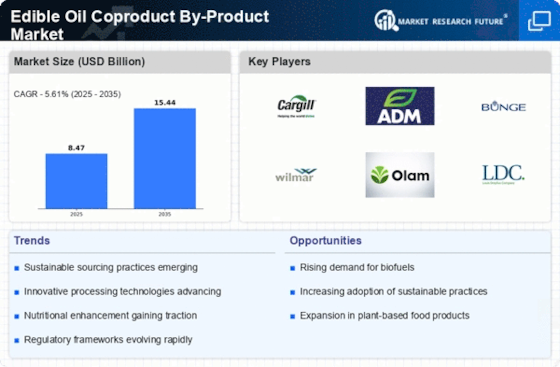Market Growth Projections
The Global Edible Oil Coproduct By-Product Market Industry is poised for substantial growth, with projections indicating a market value of 7.99 USD Billion in 2024 and an anticipated increase to 14.6 USD Billion by 2035. This growth trajectory reflects a compound annual growth rate (CAGR) of 5.64% from 2025 to 2035. Such projections highlight the increasing recognition of the value of coproducts in various applications, including food, cosmetics, and biofuels. The expanding market underscores the potential for innovation and investment in the sector, as stakeholders seek to capitalize on the opportunities presented by the growing demand for edible oil coproducts.
Growth in Food Processing Sector
The expansion of the food processing sector significantly influences the Global Edible Oil Coproduct By-Product Market Industry. As food manufacturers seek to optimize production efficiency and reduce costs, they increasingly utilize edible oil coproducts as functional ingredients. These coproducts, such as lecithin and fatty acids, enhance food quality and shelf life, making them valuable assets in food formulations. The industry's growth is anticipated to contribute to an increase in market value, projected to reach 14.6 USD Billion by 2035. This trend underscores the importance of coproducts in meeting the evolving demands of consumers and food manufacturers alike.
Health Consciousness Among Consumers
There is a growing awareness of health and wellness among consumers, which positively impacts the Global Edible Oil Coproduct By-Product Market Industry. As individuals become more health-conscious, they seek products that offer nutritional benefits, such as omega fatty acids and antioxidants found in various edible oil coproducts. This shift in consumer behavior is driving manufacturers to innovate and create healthier options, thereby expanding the market. The anticipated compound annual growth rate (CAGR) of 5.64% from 2025 to 2035 suggests that the demand for health-oriented coproducts will continue to rise, further solidifying their role in the food and beverage sector.
Regulatory Support for Waste Reduction
Regulatory frameworks aimed at waste reduction and resource optimization play a crucial role in shaping the Global Edible Oil Coproduct By-Product Market Industry. Governments worldwide are implementing policies that encourage the utilization of by-products from edible oil production, promoting a circular economy. This regulatory support incentivizes manufacturers to explore innovative ways to incorporate coproducts into their operations, thereby minimizing waste and enhancing sustainability. As these regulations become more stringent, the market is expected to adapt, leading to increased investment in coproduct development and utilization. This proactive approach may significantly contribute to the industry's growth in the coming years.
Rising Demand for Sustainable Products
The Global Edible Oil Coproduct By-Product Market Industry experiences a notable surge in demand for sustainable and eco-friendly products. Consumers are increasingly inclined towards products that minimize environmental impact, leading to a heightened interest in coproducts derived from edible oils. This trend is reflected in the projected market value of 7.99 USD Billion in 2024, indicating a robust growth trajectory. Companies are adapting their production processes to incorporate sustainable practices, which not only meet consumer preferences but also align with regulatory frameworks aimed at reducing waste. This shift towards sustainability is expected to drive innovation within the industry, fostering the development of new coproduct applications.
Technological Advancements in Processing
Technological innovations in processing techniques are transforming the Global Edible Oil Coproduct By-Product Market Industry. Advances in extraction and refining processes enhance the quality and yield of coproducts, making them more appealing to manufacturers and consumers. For instance, the adoption of supercritical fluid extraction and enzymatic processes allows for the efficient recovery of valuable compounds from edible oils. These advancements not only improve product quality but also reduce production costs, thereby fostering market growth. As technology continues to evolve, it is likely that the industry will witness an influx of new coproducts, further diversifying the market offerings.



















